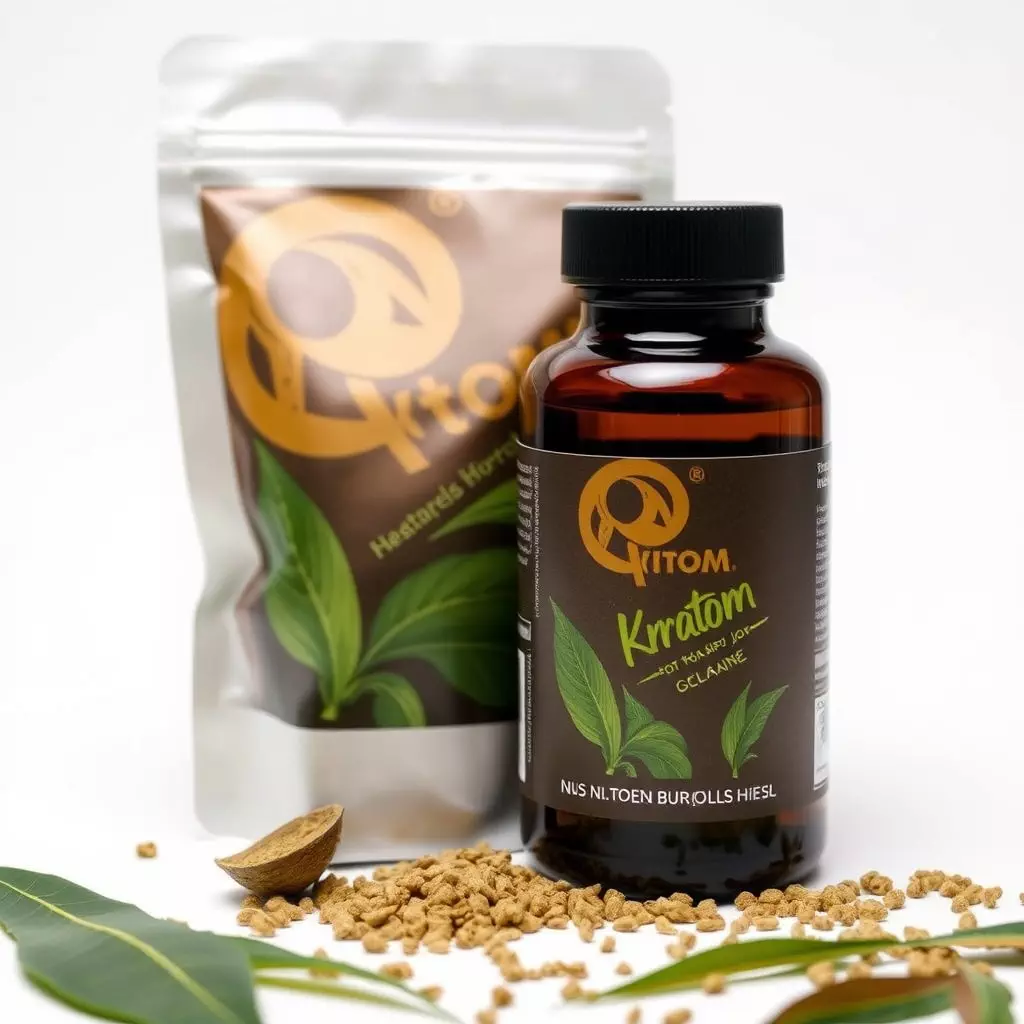The text discusses the potential benefits of kratom, a compound found in Mitragyna speciosa leaves, for managing chronic fatigue syndrome (CFS). Preliminary studies and user experiences suggest that kratom's active alkaloids, mitragynine and 7-hydroxymitragynine, may help alleviate the severe tiredness of CFS by interacting with opioid receptors. Users report a range of effects from stimulation to sedation depending on the dosage, which could be beneficial for the fluctuating energy levels characteristic of CFS. Kratom's additional properties, such as mood enhancement and pain relief, may offer advantages over conventional treatments. However, it is crucial to approach kratom with caution due to its complex interactions with the body, potential drug interactions, and the need for further scientific research into its efficacy and safety for CFS. Flash sale kratom offers can make high-quality strains like Maeng Da and Bali more accessible, but users should start with a moderate dosage to understand personal tolerance and effects. It is essential to be aware of the legal status of kratom, which varies by region, and to consult with healthcare professionals when considering incorporating kratom into a CFS treatment plan. A responsible approach includes purchasing from reputable sources that provide third-party lab results for product quality, monitoring personal responses, and adhering to a healthcare provider's guidance for a tailored management strategy that includes good nutrition and hydration practices.
exploration into the therapeutic potential of kratom, particularly its role in mitigating the debilitating effects of chronic fatigue syndrome (CFS), is gaining traction within healthcare circles. This article delves into the nuances of how kratom can be effectively managed for those suffering from CFS. We will dissect the scientific underpinnings behind kratom’s efficacy, guide you through selecting appropriate strains to optimize management of symptoms, and address safe practices during flash sales for kratom. This comprehensive overview aims to equip readers with a well-rounded understanding of integrating kratom into CFS treatment plans responsibly and effectively.
- Unraveling the Potential of Kratom in Managing Chronic Fatigue Syndrome
- Navigating Kratom Strains for Optimal Chronic Fatigue Management
- Safe Practices and Considerations When Using Kratom for CFS During Flash Sales
Unraveling the Potential of Kratom in Managing Chronic Fatigue Syndrome

Kratom, a botanical derivative from the leaves of Mitragyna speciosa, has garnered attention in various health discussions, particularly concerning its potential management role in chronic fatigue syndrome (CFS). Emerging research and anecdotal evidence suggest that kratom may offer therapeutic benefits to individuals suffering from CFS. The alkaloids present in kratom, such as mitragynine and 7-hydroxymitragynine, interact with the body’s opioid receptors, which could help alleviate the debilitating fatigue associated with this condition. Users report a stimulating effect at low doses and sedative effects at higher doses, which could be beneficial in managing the fluctuating energy levels characteristic of CFS.
Moreover, the use of kratom for CFS management is gaining traction, especially as traditional treatments often provide incomplete relief. Kratom’s ability to modulate mood and reduce pain may also contribute to its appeal among those with CFS. However, it is crucial to approach the integration of kratom into a CFS treatment plan with caution. Professional medical advice is essential, given the nuanced nature of CFS and the potential for interactions with other medications. As such, individuals interested in using kratom should consider consulting healthcare providers who are knowledgeable about this substance. Flash sale kratom offerings can provide access to high-quality kratom strains at affordable prices, making it a more viable option for those seeking alternative methods to manage their symptoms. Nonetheless, ongoing research and clinical trials are necessary to fully understand the efficacy and safety of kratom in managing CFS.
Navigating Kratom Strains for Optimal Chronic Fatigue Management

When considering the management of chronic fatigue syndrome (CFS) with kratom, it’s crucial to explore the various strains available and their unique properties that may alleviate symptoms. Kratom, a plant from Southeast Asia, has gained attention for its potential benefits in managing CFS due to its alkaloid content, which can interact with the body’s opioid receptors. For individuals seeking relief from chronic fatigue, navigating the array of kratom strains such as Maeng Da, Bali, and Borneo can be a complex task. These strains differ in their alkaloid profiles and effects; for instance, Maeng Da is known for its energizing properties, which might be beneficial during periods of extreme fatigue. On the other hand, strains like Bali are often associated with a calming effect, which could be helpful for those experiencing CFS-related anxiety or insomnia.
The selection of kratom strains for optimal CFS management should be approached with care and informed by personal experience, as each individual’s response to kratom can vary. It’s recommended to start with a lower dosage to assess tolerance and effects before considering any form of a flash sale kratom purchase, which might offer a range of strains for experimentation. Users should also be mindful of the legal status of kratom in their jurisdiction, as regulations can vary and impact availability. By carefully considering the specific needs and responses to different kratom strains, individuals with CFS may find a regimen that contributes to improved energy levels and quality of life. Remember, consultation with a healthcare provider is essential when integrating kratom into any health management plan.
Safe Practices and Considerations When Using Kratom for CFS During Flash Sales

When incorporating kratom into the management of Chronic Fatigue Syndrome (CFS) during flash sales, it is imperative to approach its use with caution and informed decision-making. Kratom, a botanical supplement derived from the leaves of Mitragyna speciosa, has been explored by some individuals for its potential energy-boosting and pain-relieving effects, which may be beneficial for CFS symptoms. However, due to the variability in kratom’s alkaloid content and the potential for interaction with other medications, safe practices are essential. Firstly, it is crucial to purchase kratom from reputable sources during flash sales to ensure product quality and safety. Look for vendors who provide third-party lab results verifying the purity and potency of their kratom products. Additionally, adhering to the recommended dosage as outlined by a healthcare provider is vital to avoid overconsumption, which can lead to adverse effects.
Furthermore, individuals with CFS should monitor their response to kratom closely. Kratom’s effects can be stimulating at lower doses and sedating at higher doses, making it a potentially dual-purpose supplement for managing the fatigue spectrum associated with CFS. It is advisable to start with a low dose to gauge its impact on energy levels and overall well-being before considering any increase in intake. Regular assessment of kratom’s effects on your condition is necessary, as personal tolerance levels can vary significantly. Engaging with a healthcare professional throughout this process is highly recommended, as they can provide guidance tailored to your unique health profile and CFS management plan. Always remember to stay hydrated and maintain nutritious eating habits when using kratom during flash sales or otherwise, as these practices support overall health and may enhance the efficacy of kratom for CFS management.
In concluding our exploration of chronic fatigue syndrome (CFS) management, it’s evident that kratom holds promise as a natural adjunct in mitigating symptoms for many sufferers. The careful selection of kratom strains, as discussed, can play a significant role in improving the quality of life for individuals with CFS. However, it is crucial to approach its use with caution, particularly during periods of flash sale kratom availability. Adhering to safe practices and considerations is paramount to ensure efficacy and safety. As research continues to evolve, the integration of kratom into CFS management may become a more mainstream approach, subject to regulatory oversight and clinical validation. With careful consideration and guidance from healthcare professionals, those with CFS can explore this potential therapeutic option responsibly.






